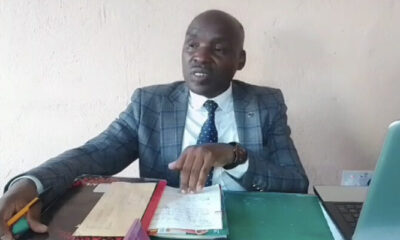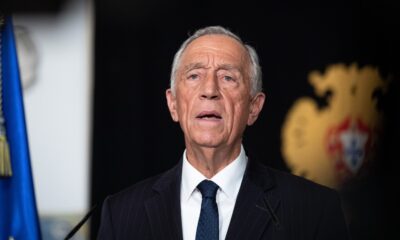Strictly Personal
Nigeria and the new NNPC by Reuben Abati
Published
2 years agoon

This day, July 19 should go down as a special moment in the economic history of Nigeria – the day when the country’s main vehicle for economic survival, the Nigerian National Petroleum Corporation (NNPC) is officially unveiled by the incumbent President as a commercial venture. The transition took effect on July 1, in line with the provisions of the Petroleum Industry Act (PIA), 2021. But by noon today, NNPC would have formally made that transition from being a corporation to become a limited liability company, a company limited by shares, to be known hereafter as NNPC Limited, that is a commercial venture. In some of our media platforms in the last few days, the NNPC hierarchy has been staging a song and a dance over the fact that the NNPC was indeed about to become a new entity. What does this mean in real terms for Nigerians? While we are all obsessed with politics, the Osun Gubernatorial election being the latest menu on the plate of the commentariat and the political elite, it seems to me that the transition that is to be unveiled today at the NNPC deserves some interest. Established in 1977, 45 years ago, the NNPC manages Nigeria’s crude oil, gas and petrochemical resources, the joint venture between Nigeria and oil multinationals, and also engages in petroleum exploration and production through the country’s four refineries.
Crude oil accounts for more than 80% of the country’s foreign exchange earnings. With Nigeria identified as the sixth largest oil producer in the world, and with the country blessed with the sweet, low-sulphur, top grade Brent Crude variety, crude oil was effectively Nigeria’s equivalent of manna from Heaven. In due course, we were told that Nigeria is even more of a gas producing country than an oil dependent country. Milk and honey practically flow under Nigeria’s soil. It has been NNPC’s business to manage all of that, and bring profit to the country. Nigeria is not the only country that has been so privileged. They have oil and gas in Saudi Arabia, Russia, Qatar, UAE, Venezuela (bad reference in the circumstance), Libya, Kuwait, the United States, Norway and quite a number of other countries. Whereas oil and gas resources have brought some countries power and glory, Nigeria’s experience has been mixed and problematic. From being a resource-rich country in the 70s and 80s, crude oil in particular has turned out to be a source of agony and pain for Nigeria. We squandered the riches. A terrible economy developed over the years around oil and gas. Politics, ethnicity, greed, corruption and all the other ailments that assail the country found a home in the oil and gas sector. This should not be surprising. The easiest way to make money in Nigeria is to get into the oily business. It was a matter of time before the people would begin to agitate for reforms and a change of regime. And it happened. Oil resource became the target of seething anger within the system. Those who believe that the oil and gas that come from their soil in the Niger Delta is theirs see no reason why anyone, any group or any region that does not produce oil and gas should benefit from other people’s endowments in a supposedly federal system. Oil became political. Politics became oily and gassy. Right at the centre of this conundrum was the NNPC, and the country’s Ministry of Petroleum Resources and everything attached thereto.
To address both the sentiments and the substance around this issue, there have been calls for resource control. From Adaka Boro to Ken Saro-Wiwa and beyond, there have been calls for true federalism, secession, respect for the rights of ethnic minorities, and counter arguments along geographical lines with the North pitched against the South on the question of who owns what, who should get what, and what share – Nigeria’s main revenue being oil and gas. In due course, the Petroleum Industry Bill was introduced to address many of the issues: governance, regulatory frameworks, community relations and management. When President Muhammadu Buhari unveils a new NNPC this morning, with a new brand, logo and identity, NNPC Limited emerging in place of the Nigerian National Petroleum Corporation, he would be giving effect to a major plank of the Petroleum Industry Act (PIA). President Buhari can comfortably claim the PIA as one of the achievements of his administration. For decades, Nigerians complained about the need for reform in the oil and gas sector. They asked for a review of joint venture frameworks. They wanted a new NNPC that would be organized for productivity and efficiency and not a mere government parastatal bogged down by politics and graft. Oil bearing communities also had their demands relating to justice, equity and fairness and how these have been treated shabbily within the larger Nigerian equation.
For decades, the Nigerian legislature toyed with the law. Under Buhari, the law was passed. It seeks to provide a new governance framework in the oil and gas sector. The law removes the subsidy in the downstream sector especially with regard to petrol. It decrees a transformation of the NNPC into a profit making, independent, commercial venture. Before now, the NNPC has been run as a cash cow for the Nigerian Government, as a dependent public sector agency. It manages the oil and gas resources of the country, makes money, transmits same to the Treasury. Every month, state governments carry bowls in hands, rush to Abuja and at what is called the Federation Accounts Allocation Committee meeting (FAAC), collect their own share of the national cake. Everyone got so greedy, everything got so mismanaged, NNPC got to a point it started protesting that there was very little to share or add again. For months, the NPPC using the excuse of under-recovery and subsidy has not been able to contribute as much as it should to the national purse. This is one reason why its reform is imperative. The PIA has offered a window but how open is that window?
The unveiling of a new NNPC should be seen correctly by industry watchers as a positive development. The need for the transition as proposed is justified by how Nigeria’s national oil company performs badly against its peers. In the wake of the Russia-Ukraine war, Russia has been using its energy resources as a weapon against Europe which depended on Russia for about 40% of its energy needs. Russia simply turned off the Nord Stream 1 pipeline for routine maintenance, and asked for payments in rouble, to push Europe into confusion, and energy prices to the roof. Countries with high demand for energy are groaning. Countries that are rich in oil and gas are smiling: Saudi Arabia and other countries of the Middle East are being wooed as the West looks for alternative sources of energy. The United States is wooing Saudi Arabia afresh. It has tried to soften a bit on Venezuela. Sri Lanka in the Indian sub-ocean is in trouble in part because it cannot provide fuel, food and medicines for the people. Pakistan is hanging on to the IMF to bail it out. Cost of living crisis is a major issue in Great Britain. While Europe is looking towards Algeria, Tunisia, and Angola for solutions and alternatives, Nigeria has been caught flat-footed. Rather than turn the current global crisis into an advantage, we are busy here lamenting that rising oil prices amount to a curse for Nigeria. We are not befitting because we are not ready. In today’s global energy mix, Nigeria pays a huge price for its own failures in managing its main resource and the plain view reason is this: the failure of leadership.
NNPC wears a new toga today. We have made that point. Restructuring of the public sector has been a recurring decimal in Nigeria’s economic history. The question has always been: how can public enterprises be made more profitable: commercialization, privatization or liberalization? Liberalization as in the telecommunication sector has resulted in growth and innovation and the end of the inefficiency of the old, state-owned NITEL. That is one good example. In a deregulated regime, the state has no control over price. It can only regulate quality. Under a privatization regime, the state can regulate, but the entity is controlled by its shareholders. The fundamental thing is: a private entity is after the maximization of profit and minimal cost. What has happened to the NNPC is commercialization, not privatization. But don’t get it twisted: NNPC still remains in the public sector. That is why it is still called Nigerian National… The only difference is that as a commercial entity, it will now have to pay more attention to its profit and cost centres. While there is a limit to which it can dictate price and profit, it must be noted that it can no longer do business as usual.
What is also new is that while the NNPC may still have a relationship with government, the same government can no longer have control over the staffing of the NNPC. The control of the Minister of Petroleum will be limited. As a commercial entity, the NNPC is beholden to its shareholders. Competence, quality will determine recruitment. The old practice of anyone in government sending notes for NNPC allocation or positions would be untenable under the new arrangement. Nobody can send in a note anyhow. The influence of rent collectors would be watered down, if not completely eliminated. It also means that the country can no longer depend mainly on NNPC for Federation Accounts returns (FAAC). The Federal Government would be entitled strictly to returns on its shares. In all of these regards, today’s development, NNPC’s transition into a commercial entity is a laudable development. The Group CEO of the new company, the erstwhile Group GMD of the NNPC whose title has thus changed, has alluded much to this when he made it clear in the past few days that (i) NNPC going forward is responsible to its shareholders as a limited liability company, (2) whatever service it provides for the Federal Government would be for a fee, (3) subsidy is not the responsibility of the NNPC, but that of the Federal Government and (iv) NNPC is committed to transparency and accountability, and accounting rules.
At the unveiling today, the Buhari government can commend itself for seeing through the PIA. But the skeptics are unrelenting and they have raised issues that we need to worry about. They argue for example that it is indeed a good and proper thing to seek to make the NNPC as efficient and as profitable as Saudi Arabia’s ARAMCO and other peers elsewhere but the problem is that NNPC is still tied to the apron strings of government. Most of the workers are still workers of the Nigerian government. As a commercial entity, it should be possible for the company to source its own expertise, consultants and staff from anywhere without the Nigerian government imposing the constraints of ethnicity and federal character. The NNPC of old ran a Nigerian-factor regime where some characters thought access to political power and influence granted them automatic control over the resource management company. Such a system would not be acceptable under the new mode of doing business. That has to change forthwith, to send the strong signal that it is indeed no longer business as usual. Second, the much-talked about NNPC shareholders are the Ministry of Finance Incorporated (MoFI) and the Nigerian Treasury, which are both government entities. NNPC says it will send debit and credit notes for services rendered to demonstrate its own accountability and commitment to EITI principles. MoFI can claim that it represents the Nigerian people. What will NNPC Ltd do if government fails to pay – this same government that does not pay electricity bills or ASUU salaries? And as things stand, it looks like NNPC truly can no longer be held responsible for monthly contributions to the Federation Account.
Nonetheless, the NNPC as a commercial entity can only succeed as much as the Federal Government wants it to. As long as the NNPC is government-linked, there will be issues. For the NNPC to succeed, it needs to function under a government that understands the meaning and implications of profit and loss. There is a need for deep reform, for the people’s overall benefit. The meaning of the new dispensation is that NNPC would have no option but to send debit notes to the Federal Government, because the company won’t be able to hide the gaps in its balance sheet. The Buhari government does not have this profit and loss orientation mindset that is required to birth a new NNPC. The responsibility for that would have to be taken up perhaps by a new government. We can only hope that the would-be next President of Nigeria, whoever he turns out to be, is thinking of this, from both an economic and national security perspective. A food for thought is the position that in the long run, the NNPC must be privatized. Its board must not be a political Board, it must be a commerce-oriented Board. The experts must be allowed to do their job, not politicians, seeking rent. NNPC shares must be sold directly to the public as a company under the Companies and Allied Matters Act (CAMA).
You may like
-


Air Peace, capitalism and national interest, By Dakuku Peterside
-


This is chaos, not governance, and we must stop it, By Tee Ngugi
-


Off we go again with public shows, humbug and clowning, By Jenerali Uliwengu
-


How patriarchy underpins gender violence today, By Tee Ngugi
-


Help! There’s a dangerous, secret plot to save the EAC from imminent death, By Charles Onyango-Obbo
-


How South Africa, US elections could shape Tshisekedi’s bread in Kinshasa, By Charles Onyango-Obbo
Strictly Personal
Air Peace, capitalism and national interest, By Dakuku Peterside
Published
1 week agoon
April 16, 2024
Nigerian corporate influence and that of the West continue to collide. The rationale is straightforward: whereas corporate activity in Europe and America is part of their larger local and foreign policy engagement, privately owned enterprises in Nigeria or commercial interests are not part of Nigeria’s foreign policy ecosystem, neither is there a strong culture of government support for privately owned enterprises’ expansion locally and internationally.
The relationship between Nigerian businesses and foreign policy is important to the national interest. When backing domestic Nigerian companies to compete on a worldwide scale, the government should see it as a lever to drive foreign policy, and national strategic interest, promote trade, enhance national security considerations, and minimize distortion in the domestic market as the foreign airlines were doing, boost GDP, create employment opportunities, and optimize corporate returns for the firms.
Admitted nations do not always interfere directly in their companies’ business and commercial dealings, and there are always exceptions. I can cite two areas of exception: military sales by companies because of their strategic implications and are, therefore, part of foreign and diplomatic policy and processes. The second is where the products or routes of a company have implications for foreign policy. Air Peace falls into the second category in the Lagos – London route.
Two events demonstrate an emerging trend that, if not checked, will disincentivize Nigerian firms from competing in the global marketplace. There are other notable examples, but I am using these two examples because they are very recent and ongoing, and they are typological representations of the need for Nigerian government backing and support for local companies that are playing in a very competitive international market dominated by big foreign companies whose governments are using all forms of foreign policies and diplomacy to support and sustain.
The first is Air Peace. It is the only Nigerian-owned aviation company playing globally and checkmating the dominance of foreign airlines. The most recent advance is the commencement of flights on the Lagos – London route. In Nigeria, foreign airlines are well-established and accustomed to a lack of rivalry, yet a free-market economy depends on the existence of competition. Nigeria has significantly larger airline profits per passenger than other comparable African nations. Insufficient competition has resulted in high ticket costs and poor service quality. It is precisely this jinx that Air Peace is attempting to break.
On March 30, 2024, Air Peace reciprocated the lopsided Bilateral Air Service Agreement, BASA, between Nigeria and the United Kingdom when the local airline began direct flight operations from Lagos to Gatwick Airport in London. This elicited several reactions from foreign airlines backed by their various sovereigns because of their strategic interest. A critical response is the commencement of a price war. Before the Air Peace entry, the price of international flight tickets on the Lagos-London route had soared to as much as N3.5 million for the economy ticket. However, after Air Peace introduced a return economy class ticket priced at N1.2 million, foreign carriers like British Airways, Virgin Atlantic, and Qatar Airways reduced their fares significantly to remain competitive.
In a price war, there is little the government can do. In an open-market competitive situation such as this, our government must not act in a manner that suggests it is antagonistic to foreign players and competitors. There must be an appearance of a level playing field. However, government owes Air Peace protection against foreign competitors backed by their home governments. This is in the overall interest of the Nigerian consumer of goods and services. Competition history in the airspace works where the Consumer Protection Authority in the host country is active. This is almost absent in Nigeria and it is a reason why foreign airlines have been arbitrary in pricing their tickets. Nigerian consumers are often at the mercy of these foreign firms who lack any vista of patriotism and are more inclined to protect the national interest of their governments and countries.
It would not be too much to expect Nigerian companies playing globally to benefit from the protection of the Nigerian government to limit influence peddling by foreign-owned companies. The success of Air Peace should enable a more competitive and sustainable market, allowing domestic players to grow their network and propel Nigeria to the forefront of international aviation.
The second is Proforce, a Nigerian-owned military hardware manufacturing firm active in Rwanda, Chad, Mali, Ghana, Niger, Burkina Faso, and South Sudan. Despite the growing capacity of Proforce in military hardware manufacturing, Nigeria entered two lopsided arrangements with two UAE firms to supply military equipment worth billions of dollars , respectively. Both deals are backed by the UAE government but executed by UAE firms.
These deals on a more extensive web are not unconnected with UAE’s national strategic interest. In pursuit of its strategic national interest, India is pushing Indian firms to supply military equipment to Nigeria. The Nigerian defence equipment market has seen weaker indigenous competitors driven out due to the combination of local manufacturers’ lack of competitive capacity and government patronage of Asian, European, and US firms in the defence equipment manufacturing sector. This is a misnomer and needs to be corrected.
Not only should our government be the primary customer of this firm if its products meet international standards, but it should also support and protect it from the harsh competitive realities of a challenging but strategic market directly linked to our national military procurement ecosystem. The ability to produce military hardware locally is significant to our defence strategy.
This firm and similar companies playing in this strategic defence area must be considered strategic and have a considerable place in Nigeria’s foreign policy calculations. Protecting Nigeria’s interests is the primary reason for our engagement in global diplomacy. The government must deliberately balance national interest with capacity and competence in military hardware purchases. It will not be too much to ask these foreign firms to partner with local companies so we can embed the technology transfer advantages.
Our government must create an environment that enables our local companies to compete globally and ply their trades in various countries. It should be part of the government’s overall economic, strategic growth agenda to identify areas or sectors in which Nigerian companies have a competitive advantage, especially in the sub-region and across Africa and support the companies in these sectors to advance and grow to dominate in the African region with a view to competing globally. Government support in the form of incentives such as competitive grants ,tax credit for consumers ,low-interest capital, patronage, G2G business, operational support, and diplomatic lobbying, amongst others, will alter the competitive landscape. Governments and key government agencies in the west retain the services of lobbying firms in pursuit of its strategic interest.
Nigerian firms’ competitiveness on a global scale can only be enhanced by the support of the Nigerian government. Foreign policy interests should be a key driver of Nigerian trade agreements. How does the Nigerian government support private companies to grow and compete globally? Is it intentionally mapping out growth areas and creating opportunities for Nigerian firms to maximize their potential? Is the government at the domestic level removing bottlenecks and impediments to private company growth, allowing a level playing field for these companies to compete with international companies?
Why is the government patronising foreign firms against local firms if their products are of similar value? Why are Nigerian consumers left to the hands of international companies in some sectors without the government actively supporting the growth of local firms to compete in those sectors? These questions merit honest answers. Nigerian national interest must be the driving factor for our foreign policies, which must cover the private sector, just as is the case with most developed countries. The new global capitalism is not a product of accident or chance; the government has choreographed and shaped it by using foreign policies to support and protect local firms competing globally. Nigeria must learn to do the same to build a strong economy with more jobs.
Strictly Personal
This is chaos, not governance, and we must stop it, By Tee Ngugi
Published
2 weeks agoon
April 10, 2024
The following are stories that have dominated mainstream media in recent times. Fake fertiliser and attempts by powerful politicians to kill the story. A nation of bribes, government ministries and corporations where the vice is so routine that it has the semblance of policy. Irregular spending of billions in Nairobi County.
Billions are spent in all countries on domestic and foreign travel. Grabbing of land belonging to state corporations, was a scam reminiscent of the Kanu era when even public toilets would be grabbed. Crisis in the health and education sectors.
Tribalism in hiring for state jobs. Return of construction in riparian lands and natural waterways. Relocation of major businesses because of high cost of power and heavy taxation. A tax regime that is so punitive, it squeezes life out of small businesses. Etc, ad nauseam.
To be fair, these stories of thievery, mismanagement, negligence, incompetence and greed have been present in all administrations since independence.
However, instead of the cynically-named “mama mboga” government reversing this gradual slide towards state failure, it is fuelling it.
Alternately, it’s campaigning for 2027 or gallivanting all over the world, evoking the legend of Emperor Nero playing the violin as Rome burned.
A government is run based on strict adherence to policies and laws. It appoints the most competent personnel, irrespective of tribe, to run efficient departments which have clear-cut goals.
It aligns education to its national vision. Its strategies to achieve food security should be driven by the best brains and guided by innovative policies. It enacts policies that attract investment and incentivize building of businesses. It treats any kind of thievery or negligence as sabotage.
Government is not a political party. Government officials should have nothing to do with political party matters. They should be so engaged in their government duties that they literally would not have time for party issues. Government jobs should not be used to reward girlfriends and cronies.
Government is exhausting work undertaken because of a passion to transform lives, not for the trappings of power. Government is not endless campaigning to win the next election. To his credit, Mwai Kibaki left party matters alone until he had to run for re-election.
We have corrupted the meaning of government. We have parliamentarians beholden to their tribes, not to ideas.
We have incompetent and corrupt judges. We have a civil service where you bribe to be served. Police take bribes to allow death traps on our roads. We have urban planners who plan nothing except how to line their pockets. We have regulatory agencies that regulate nothing, including the intake of their fat stomachs.
We have advisers who advise on which tenders should go to whom. There is no central organising ethos at the heart of government. There is no sense of national purpose. We have flurries of national activities, policies, legislation, appointments which don’t lead to meaningful growth. We just run on the same spot.
Tee Ngugi is a Nairobi-based political commentator
EDITOR’S PICK


Nigeria’s NGX Group enters into strategic investment partnership with Ethiopian Securities Exchange
Leading Nigerian integrated market infrastructure group in Africa, the Nigerian Exchange Group (NGX), has announced strategic investment in the Ethiopian...


Namibia govt condemns tourists posing naked on Big Daddy Dune
The Namibian authorities have frowned at tourists who posed naked at the Big Daddy Dune, the country’s top tourist attraction...


Domestic worker sues Pitso Mosimane, wife following debilitating injuries
Former Mamelodi Sundowns of South Africa and Al Ahli of Egypt coach, Pitso Mosimane, and his wife, Moira Tlhagale, have...


Media polarisation blamed for biased coverage, civil society leader calls for mindset shift
Chama Mwansa, Executive Director of the Chandarika Women and Youths Foundation, has attributed media biases to the similarities in coverage...


Nigeria: 118 prison inmates escape after rainstorm destroys facility
At least 118 inmates of the Medium Security Custodial Centre in Suleja, Niger State, in northern Nigeria, have reportedly escaped...


Tanzania’s auto-tech startup Spana is simplifying car maintenance— CEO
Tanzania’s auto-tech startup, Spana, has developed a mobile application for a bouquet of automobile services, enabling individual car owners and...


Nollywood thrown into mourning as another veteran actor Zulu Adigwe passes on
The Nigerian movie industry, popularly known as Nollywood, has once again been thrown into mourning with the death of veteran...


Zambian FA boss, Gen.Sec arrested over alleged laundering of K341,902
President of the Football Association of Zambia (FAZ), Andrew Kamanga, has been arrested along with the Secretary-General and two other...


Luapula businessman, Munsanje, reflects on media freedoms and freedom of expression
As stakeholder engagement intensifies regarding the ongoing project to amplify voices on media freedom, freedom of expression, and digital rights,...


World Bank stops tourism fund to Tanzania’s Ruaha park. Here’s why
A spokesperson for the World Bank said on Wednesday that the lender had stopped all new payments from a $150...
Trending
-

 Musings From Abroad2 days ago
Musings From Abroad2 days agoPresident de Sousa insists Portugal must ‘pay costs’ of slavery, colonial crimes
-

 Tech1 day ago
Tech1 day agoTanzania’s auto-tech startup Spana is simplifying car maintenance— CEO
-

 Politics2 days ago
Politics2 days agoDigital Rights: Policy enthusiast, Jere, advocates self-regulation as alternative to govt regulations
-

 Culture1 day ago
Culture1 day agoNollywood thrown into mourning as another veteran actor Zulu Adigwe passes on


